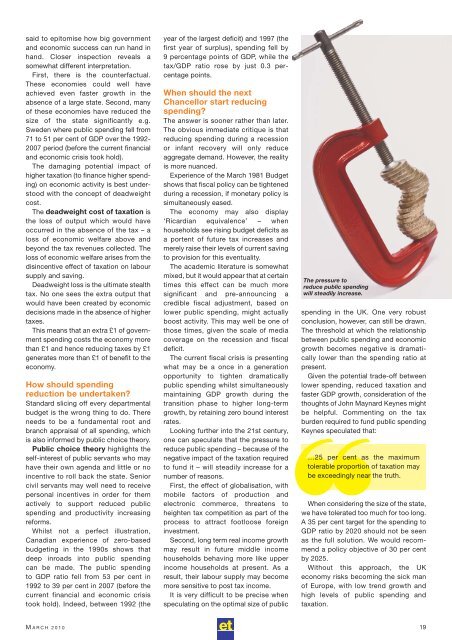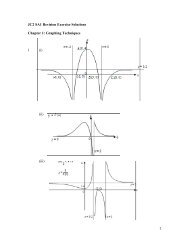Eco Today - Mar10:ET Master Page 2007 - ASKnLearn
Eco Today - Mar10:ET Master Page 2007 - ASKnLearn
Eco Today - Mar10:ET Master Page 2007 - ASKnLearn
Create successful ePaper yourself
Turn your PDF publications into a flip-book with our unique Google optimized e-Paper software.
said to epitomise how big government<br />
and economic success can run hand in<br />
hand. Closer inspection reveals a<br />
somewhat different interpretation.<br />
First, there is the counterfactual.<br />
These economies could well have<br />
achieved even faster growth in the<br />
absence of a large state. Second, many<br />
of these economies have reduced the<br />
size of the state significantly e.g.<br />
Sweden where public spending fell from<br />
71 to 51 per cent of GDP over the 1992-<br />
<strong>2007</strong> period (before the current financial<br />
and economic crisis took hold).<br />
The damaging potential impact of<br />
higher taxation (to finance higher spend -<br />
ing) on economic activity is best under -<br />
stood with the concept of deadweight<br />
cost.<br />
The deadweight cost of taxation is<br />
the loss of output which would have<br />
occurred in the absence of the tax – a<br />
loss of economic welfare above and<br />
beyond the tax revenues collected. The<br />
loss of economic welfare arises from the<br />
disincentive effect of taxation on labour<br />
supply and saving.<br />
Deadweight loss is the ultimate stealth<br />
tax. No one sees the extra output that<br />
would have been created by economic<br />
decisions made in the absence of higher<br />
taxes.<br />
This means that an extra £1 of govern -<br />
ment spending costs the economy more<br />
than £1 and hence reducing taxes by £1<br />
generates more than £1 of benefit to the<br />
economy.<br />
How should spending<br />
reduction be undertaken?<br />
Standard slicing off every departmental<br />
budget is the wrong thing to do. There<br />
needs to be a fundamental root and<br />
branch appraisal of all spending, which<br />
is also informed by public choice theory.<br />
Public choice theory highlights the<br />
self-interest of public servants who may<br />
have their own agenda and little or no<br />
incentive to roll back the state. Senior<br />
civil servants may well need to receive<br />
personal incentives in order for them<br />
actively to support reduced public<br />
spend ing and productivity increasing<br />
reforms.<br />
Whilst not a perfect illustration,<br />
Canadian experience of zero-based<br />
budgeting in the 1990s shows that<br />
deep inroads into public spending<br />
can be made. The public spending<br />
to GDP ratio fell from 53 per cent in<br />
1992 to 39 per cent in <strong>2007</strong> (before the<br />
current financial and economic crisis<br />
took hold). Indeed, between 1992 (the<br />
year of the largest deficit) and 1997 (the<br />
first year of surplus), spending fell by<br />
9 percentage points of GDP, while the<br />
tax/GDP ratio rose by just 0.3 per -<br />
centage points.<br />
When should the next<br />
Chancellor start reducing<br />
spending?<br />
The answer is sooner rather than later.<br />
The obvious immediate critique is that<br />
reducing spending during a recession<br />
or infant recovery will only reduce<br />
aggregate demand. However, the reality<br />
is more nuanced.<br />
Experience of the March 1981 Budget<br />
shows that fiscal policy can be tightened<br />
during a recession, if monetary policy is<br />
simultaneously eased.<br />
The economy may also display<br />
‘Ricardian equivalence’ – when<br />
households see rising budget deficits as<br />
a portent of future tax increases and<br />
merely raise their levels of current saving<br />
to provision for this eventuality.<br />
The academic literature is somewhat<br />
mixed, but it would appear that at certain<br />
times this effect can be much more<br />
significant and pre-announcing a<br />
credible fiscal adjustment, based on<br />
lower public spending, might actually<br />
boost activity. This may well be one of<br />
those times, given the scale of media<br />
coverage on the recession and fiscal<br />
deficit.<br />
The current fiscal crisis is presenting<br />
what may be a once in a generation<br />
opportunity to tighten dramatically<br />
public spending whilst simultaneously<br />
maintaining GDP growth during the<br />
transition phase to higher long-term<br />
growth, by retaining zero bound interest<br />
rates.<br />
Looking further into the 21st century,<br />
one can speculate that the pressure to<br />
reduce public spending – because of the<br />
negative impact of the taxation required<br />
to fund it – will steadily increase for a<br />
number of reasons.<br />
First, the effect of globalisation, with<br />
mobile factors of production and<br />
electronic commerce, threatens to<br />
heighten tax competition as part of the<br />
process to attract footloose foreign<br />
investment.<br />
Second, long term real income growth<br />
may result in future middle income<br />
households behaving more like upper<br />
income households at present. As a<br />
result, their labour supply may become<br />
more sensitive to post tax income.<br />
It is very difficult to be precise when<br />
speculating on the optimal size of public<br />
The pressure to<br />
reduce public spending<br />
will steadily increase.<br />
spending in the UK. One very robust<br />
conclusion, however, can still be drawn.<br />
The threshold at which the relationship<br />
between public spending and economic<br />
growth becomes negative is dramati -<br />
cally lower than the spending ratio at<br />
present.<br />
Given the potential trade-off between<br />
lower spending, reduced taxation and<br />
faster GDP growth, consideration of the<br />
thoughts of John Maynard Keynes might<br />
be helpful. Commenting on the tax<br />
burden required to fund public spending<br />
Keynes speculated that:<br />
❝…25 per cent as the maximum<br />
tolerable proportion of taxation may<br />
be exceedingly near the truth.<br />
When considering the size of the state,<br />
we have tolerated too much for too long.<br />
A 35 per cent target for the spending to<br />
GDP ratio by 2020 should not be seen<br />
as the full solution. We would recom -<br />
mend a policy objective of 30 per cent<br />
by 2025.<br />
Without this approach, the UK<br />
economy risks becoming the sick man<br />
of Europe, with low trend growth and<br />
high levels of public spending and<br />
taxation.<br />
M ARCH 2010 19

















